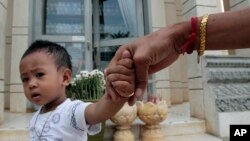Over the weekend, news filtered out that Vietnam had lifted a days-old ban on a beloved song by Trinh Con Son, who irritated the South and infuriated the North during years of fighting.
On April 11, Vietnam's ruling Communist government decreed that “Noi vong tay lon” (“The Great Circle of Vietnam”) could no longer be broadcast or played in public.
The decision came in response to a request from Trinh's family, who wanted to mount a tribute on April 21 at the Huế College of Medicine and Pharmacy.
Trinh wrote anti-war songs that each side felt sapped the fighting will of their soldiers, who, with their civilian counterparts, memorized the lyrics of his love songs as soon as they were released.
Song envisions people holding hands
The ruling Communist Party in the North banned Trinh's music, which nonetheless provided the soundtrack to years of tumult.
Of all the hundreds of songs Trinh wrote, “The Great Circle of Vietnam,” which envisions people holding hands in a circle large enough to encompass his nation, may be the most significant. Within hours of the fall of Saigon in 1975, he sang it live from the city on the official radio station of the victorious north.
Popular during the war, the anti-war song overnight became a call for both sides to unite, a transformation engineered, in part by the Communist Party head in Ho Chi Minh City, Vo Van Kiet, who went on to become prime minister from 1991 to 1997, and then an outspoken critic of the party.
“Even though “Noi vong tay lon” is very popular, and has been played in many meetings and entertainment programs, in fact everyone sings it without permission,” Nguyen Dang Chuong, head of the Department of Performance Arts, told local media when issuing the ban.
Five other love songs banned
Pham Cong Ut, a Saigon lawyer, told VOA he found the government's “without permission” argument disingenuous. “I think they're more concerned with the song's point of view more than the law.”
The ban came soon after the government had squelched five other love songs popular in the South during the war. But banning “The Great Circle of Vietnam” may have been a step too far.
Trinh's sister, the singer Trinh Vinh Trinh, told local media the family was surprised at the government's response. So were his fans, judging from the outcry on social media.
Although Trinh died on April 1, 2001, he remains huge throughout the Vietnamese diaspora as well as in Vietnam, which served as his muse.
Vietnam’s Bob Dylan
Trinh's lyrics and attitude earned the title of "Vietnam's Bob Dylan." They also earned him several years of post-unification “re-education” despite Hanoi's embrace of “Noi vong tay lon.”
“This song, I see nothing to be banned,” Phu Quang, a songwriter whose music is closely identified with Hanoi — the city, not the government — told VOA. “This is one of the anti-war songs of Trinh Con Son, and it is a good song. For a long time, we've talked about reconciliation, so why is this song seen as a song of the opposition?”
The reconciliation Phu Quang mentions refers to rapprochement between the North and South, and the people of Vietnam with those who have left the country.
People proved stronger than law
“Vo Van Kiet, he allowed this song to be popular,” Bui Chi VInh, a Ho Chi Minh City poet, told VOA when the song was banned. “So now, there's a review of the song, which shows the inconsistency of the government and the different factions.”
“There is a power stronger than the law — the people,” said Phu Quang at the time of the ban. “Anything [the government does] that is unreasonable, they will not let it stand.”
And on April 12, Vietnamese media reported that Nguyen of the Department for Performing Arts said the ban was lifted because the song has “good content.”
This report originated on VOA Vietnamese.











